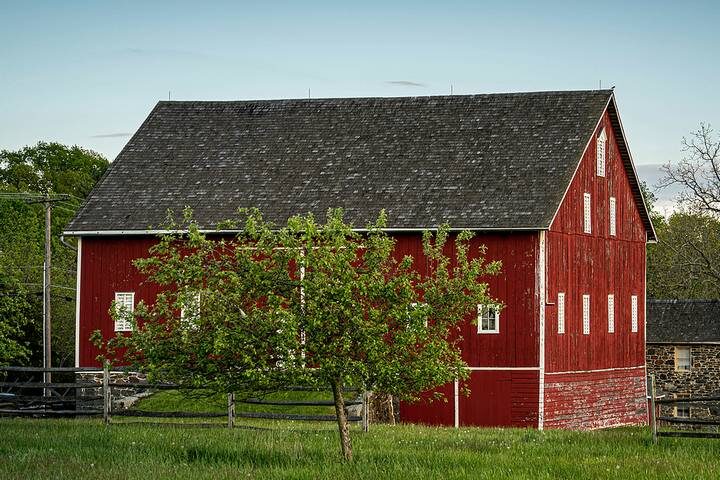Small farms are the heart and soul of sustainable agriculture, and having a well-designed barn is essential. It’s not just a place to store your tools and house your animals; it’s a hub for your daily operations.
These barn ideas for small farms offer options to optimize your space, improve efficiency, and enhance sustainability. Remember that your barn can be more than just a place to house animals and store equipment; it can be a dynamic hub for productivity and sustainability on your small farm. With the right barn design, you can ensure your farm thrives and continues to be a place of growth and success.
The following are ideas to help you optimize your space and boost productivity on your small farm.
Idea #1: Animal Housing

Animal housing on small farms should prioritize comfort, health, and efficient space utilization. Consider open-air shelters or well-ventilated barns with appropriately sized stalls or coops. Employing deep bedding for livestock can improve waste management and provide warmth. Encourage natural light in housing units and implement insulation for temperature control.
Adequate feed and water access and easy cleaning systems are essential. Design your animal housing to accommodate the specific needs of your livestock. This will ensure a safe and stress-free environment that contributes to their well-being and productivity.
Idea #2: Barn Fans

Barn fans are indispensable for small farms. These fans provide essential ventilation, maintaining optimal air quality and temperature inside the barn. They are crucial in keeping livestock comfortable, impacting their health and productivity. By ensuring proper airflow and cooling, barn fans reduce the risk of heat stress during sweltering summers and prevent the buildup of harmful gases and odours.
Investing in the right type and placement of barn fans enhances animal welfare. It contributes to the overall efficiency and success of a small farm, making it a fundamental component of any farm’s infrastructure.
Idea #3: Storage for Equipment

Efficient equipment storage is vital for small farms to maximize space and maintain order. Consider wall-mounted racks, pegboards, and shelving systems to organize tools and small items. Larger equipment like tractors can be stored in designated areas or sheds, protecting them from the elements. Implement a labelling system for easy identification and retrieval.
Freestanding or portable storage units can provide extra space without needing permanent construction. Regular maintenance and cleaning schedules are essential to extend the lifespan of your equipment and ensure everything is ready for use when needed.
Idea #4: Feeding and Watering Equipment

Feeding and watering equipment for small farms should be efficient and animal-friendly. Automatic feeders and waterers help maintain a consistent supply and minimize labour. Tailor equipment to suit your livestock, considering size, accessibility, and waste reduction. Hanging feeders, troughs, and gravity-fed systems work well for various animals.
Ensure easy cleaning and maintenance to promote hygiene. Properly designed equipment optimizes feeding and watering and supports your animals’ health and growth. Invest in durable, well-constructed options that can withstand the rigours of farm life.
Idea #5: Feed Storage

A feed storage room needs to be well-ventilated and rodent-proof. Equip your feed room with sturdy bins, barrels, or containers, depending on the feed types used. Keep the feed storage area clean and dry to prevent spoilage and contamination.
Efficient feed storage rooms are essential for preserving feed quality, managing costs, and providing your livestock with the proper nutrition, contributing to your farm’s overall success and sustainability.
Idea #6: Office Space

Office space on a small farm serves as the administrative hub on a small farm. This space should be functional yet compact, housing essential tools like a computer, printer, and filing system. This space is where records, schedules, and finances are managed. It also facilitates communication with suppliers, customers, and regulatory agencies.
An office provides a quiet retreat to strategize and reflect, helping you make informed decisions for your farm’s growth. A well-organized office space ensures efficient operations, allowing you to balance the practical demands of farming with the necessary administrative tasks for a thriving small farm.
Idea #7: Solar Panels

Harness the power of the sun to make your barn more sustainable. On small farms, solar panels can power lighting, machinery, water pumps, and even heating or cooling systems. They offer energy independence and, in some cases, allow excess energy to be sold back to the grid, providing an additional income source.
Idea #8: Rainwater Collection Systems

Barns can have rainwater collection systems to conserve water and reduce dependency on traditional sources. Collecting rainwater from your barn’s roof can provide a sustainable water source for your animals and gardens or even for general cleaning. They are cost-effective and eco-friendly, conserving water and lowering utility bills.
The collected rainwater is often purer than groundwater, benefiting plant health and reducing chemical use. Rainwater systems are flexible and can be tailored to your farm’s needs, from simple rain barrels to more complex cisterns and distribution networks.




